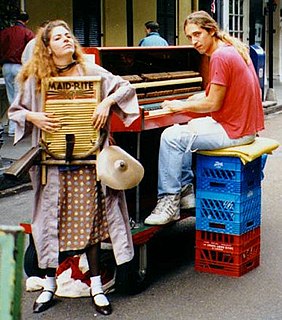
The washtub bass, or gutbucket, is a stringed instrument used in American folk music that uses a metal washtub as a resonator. Although it is possible for a washtub bass to have four or more strings and tuning pegs, traditional washtub basses have a single string whose pitch is adjusted by pushing or pulling on a staff or stick to change the tension.

Hares and jackrabbits are leporids belonging to the genus Lepus. Hares are classified in the same family as rabbits. They are similar in size and form to rabbits and have similar herbivorous diets, but generally have longer ears and live solitarily or in pairs. Also unlike rabbits, their young are able to fend for themselves shortly after birth rather than emerging blind and helpless. Most are fast runners. Hare species are native to Africa, Eurasia and North America.

A jug band is a band employing a jug player and a mix of conventional and homemade instruments. These homemade instruments are ordinary objects adapted to or modified for making sound, like the washtub bass, washboard, spoons, bones, stovepipe, jew's harp, and comb and tissue paper. The term jug band is loosely used in referring to ensembles that also incorporate homemade instruments but that are more accurately called skiffle bands, spasm bands, or juke bands because they do not include a jug player.

The washboard and frottoir are used as a percussion instrument, employing the ribbed metal surface of the cleaning device as a rhythm instrument. As traditionally used in jazz, zydeco, skiffle, jug band, and old-time music, the washboard remained in its wooden frame and is played primarily by tapping, but also scraping the washboard with thimbles. Often the washboard has additional traps, such as a wood block, a cowbell, and even small cymbals. Conversely, the frottoir dispenses with the frame and consists simply of the metal ribbing hung around the neck. It is played primarily with spoon handles or bottle openers in a combination of strumming, scratching, tapping and rolling. The frottoir or vest frottoir is played as a stroked percussion instrument, often in a band with a drummer, while the washboard generally is a replacement for drums. In Zydeco bands, the frottoir is usually played with bottle openers, to make a louder sound. It tends to play counter-rhythms to the drummer. In a jug band, the washboard can also be stroked with a single whisk broom and functions as the drums for the band, playing only on the back-beat for most songs, a substitute for a snare drum. In a four-beat measure, the washboard will stroke on the 2-beat and the 4-beat. Its best sound is achieved using a single steel-wire snare-brush or whisk broom. However, in a jazz setting, the washboard can also be played with thimbles on all fingers, tapping out much more complex rhythms, as in The Washboard Rhythm Kings, a full-sized band, and Newman Taylor Baker.

The Memphis blues is a style of blues music created from the 1910s to the 1930s by musicians in the Memphis area, like Frank Stokes, Sleepy John Estes, Furry Lewis and Memphis Minnie. The style was popular in vaudeville and medicine shows and was associated with Beale Street, the main entertainment area in Memphis, W. C. Handy, the "Father of the Blues", published the song "The Memphis Blues". In lyrics, the phrase has been used to describe a depressed mood.

Viverridae is a family of small to medium-sized mammals, the viverrids, comprising 15 genera, which are subdivided into 38 species. This family was named and first described by John Edward Gray in 1821. Members of this family are commonly called civets or genets. Viverrids are found in South and Southeast Asia, across the Wallace Line, all over Africa, and into southern Europe. Their occurrence in Sulawesi and in some of the adjoining islands shows them to be ancient inhabitants of the Old World tropics.

The African palm civet, also known as the two-spotted palm civet, is a small feliform mammal widely distributed in sub-Saharan Africa. It is listed as Least Concern on the IUCN Red List.

The African civet is a large viverrid native to sub-Saharan Africa, where it is considered common and widely distributed in woodlands and secondary forests. It is listed as Least Concern on the IUCN Red List since 2008. In some countries, it is threatened by hunting, and wild-caught individuals are kept for producing civetone for the perfume industry.
The Memphis Jug Band was an American musical group active from the mid-1920s to the late 1950s. The band featured harmonica, kazoo, fiddle and mandolin or banjolin, backed by guitar, piano, washboard, washtub bass and jug. They played slow blues, pop songs, humorous songs and upbeat dance numbers with jazz and string band flavors. The band made the first commercial recordings in Memphis, Tennessee, and recorded more sides than any other prewar jug band.

The Malabar large-spotted civet, also known as the Malabar civet, is a viverrid endemic to the Western Ghats of India. It is listed as Critically Endangered on the IUCN Red List as the population is estimated to number fewer than 250 mature individuals. It has not been recorded during surveys carried out between 1990 and 2014. In the early 1990s, isolated populations still survived in less disturbed areas of South Malabar but were seriously threatened by habitat destruction and hunting outside protected areas.
Jugging is the process of stewing whole animals, mainly game or fish, for an extended period in a tightly covered container such as a casserole or an earthenware jug. In French, such a stew of a game animal thickened with the animal's blood is known as a civet.

Hose's palm civet, also known as Hose's civet, is a viverrid species endemic to the island of Borneo. It is listed on the IUCN Red List as Vulnerable because of an ongoing population decline, estimated to be more than 30% over the last three generations and suspected to be more than 30% in the next three generations due to declines in population inferred from habitat destruction and degradation.

The small Indian civet is a civet native to South and Southeast Asia. It is listed as Least Concern on the IUCN Red List because of its widespread distribution, widespread habitat use and healthy populations living in agricultural and secondary landscapes of many range states.

Owston's palm civet is a civet native to Vietnam, Laos and southern China. It is listed as Endangered by IUCN because of an ongoing population decline, estimated to be more than 50% over the last three generations, inferred from over-exploitation, habitat destruction and degradation.

The banded palm civet, also called the banded civet, is a civet found in the Sundaic region and occurs in peninsular Myanmar, peninsular Malaysia, peninsular Thailand and in Indonesia on the islands of Sipura, Sumatra and Borneo. It is listed as Near Threatened on the IUCN Red List because of its large geographic and elevation range and tolerance to some habitat disturbance.

The golden palm civet is a palm civet endemic to Sri Lanka. It is listed as Vulnerable on the IUCN Red List. Its distribution is severely fragmented, and the extent and quality of its habitat in Sri Lanka's hill regions are declining.
"In the Jailhouse Now" is an American novelty blues song originally found in vaudeville performances from the early 20th century, usually credited to Jimmie Rodgers. The song's first two verses trace the exploits of Ramblin’ Bob, who cheats at cards and gets caught, while the final verse tells about taking a girl named Susie out on the town and winding up in jail together.

A civet is a small, lean, mostly nocturnal mammal native to tropical Asia and Africa, especially the tropical forests. The term civet applies to over a dozen different mammal species. Most of the species diversity is found in southeast Asia. The best-known civet species is the African civet, Civettictis civetta, which historically has been the main species from which a musky scent used in perfumery was obtained. The word civet may also refer to the distinctive musky scent produced by the animals.

Euplerinae, more commonly known as malagasy civets, is a subfamily of carnivorans that includes four species restricted to Madagascar. Together with the subfamily Galidiinae, which also only occurs on Madagascar, it forms the family Eupleridae. Members of this subfamily, which include the fossa, falanoucs and Malagasy civet, were placed in families like Felidae and Viverridae before genetic data indicated their consanguinity with other Madagascar carnivorans. Within the subfamily, the falanouc and Malagasy civet are more closely related to each other than to the fossa.
Civet, also known as civet musk, is the glandular secretion produced by both sexes of Viverridae species.















